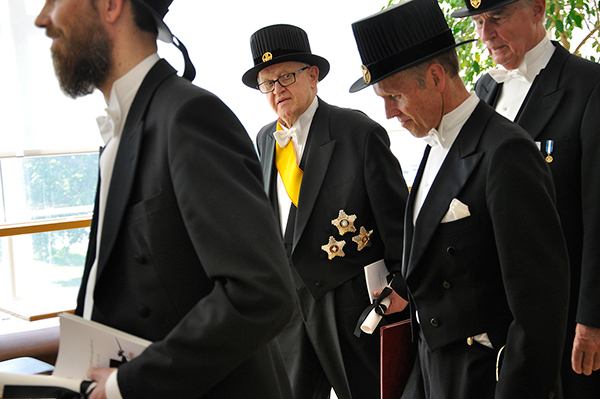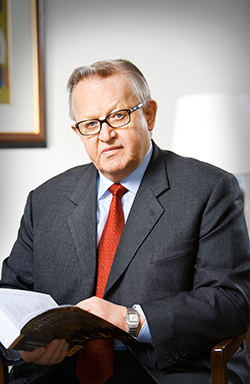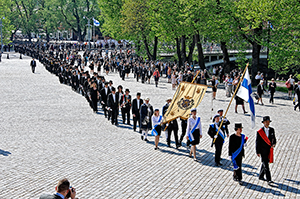A doctoral conferral ceremony was held at Åbo Akademi University in 2014. The degree of Honorary Doctor in Political Science at the Department of Social Sciences was conferred upon President Martti Ahtisaari.
Text: Marcus Prest
Martti Ahtisaari was the tenth president of the Republic of Finland in 1994–2000. Recognised as one of the world’s foremost peace mediators, Ahtisaari was awarded the Nobel Peace Prize in 2008. In his work he has made an essential contribution to the peace processes in, for example, Namibia, Indonesia and Kosovo. He is the founder of the independent peace organisation Crisis Management Initiative (CMI). President Ahtisaari was awarded the degree of Honorary Doctor at Åbo Akademi in recognition of his efforts as a peace mediator and as an avid advocate for the position of the Swedish language in Finland.
“Mr President, in his memoirs, Tony Blair describes you as highly competent and humble – his appraisal is connected to your peace work in Northern Ireland. What does humbleness entail in the work of a peace mediator? Do you agree with Mr. Blair’s description of you?”
“First of all, I must say I admire Tony Blair. He has been criticised a lot, but if he hadn’t been so active and determined, the result of the peace negotiations would not have been as positive as it was.”
“And if Tony Blair finds me competent, I will not disagree with him. I also checked the quotation you mention, and he actually uses the word ‘modest’. Perhaps it is right to say that if your motivation for participating in peace negotiations is based on an ego trip, you’re in the wrong place. I tend to ask such people to leave the process.”
“To develop the idea of being ’modest’, it could be illustrated by the following incident: Recently, we had a problem with the radiators in the office, and the rooms turned cold. We phoned a repairman who came and fixed the radiators for us. And I must say that it’s always nice to watch a real professional at work. A professional has no need for ego trips. The repairman knew what had to be done, and he was efficient, very professional. That’s the way I want work to be carried out. This also pertains to peace work. We assist with practical things. The actual agreement has to be made by the parties themselves.”
“In the case of Northern Ireland I usually say: ‘We took on the political process when it was in the intensive care unit: we sent it back after one year, not out of the hospital, but on to the general ward.’ In other words, the process was not complete when we turned it over the parties, but it was manageable.”
“Is this a description that can be applied to all peace work?”
“Often the negotiations are relatively easy; it is the actual peace building which is the difficult part. Therefore we must also be present after the end of the negotiations and be prepared to assist with practical solutions. Take, for example, Aceh where CMI worked between the years 2005 and 2012. Fairly soon everybody was eager to sign a peace agreement, but with that achieved, the difficult part of the process began. People were elected into the parliaments to lead the administration. These were people who totally lacked experience in administration; they had never done anything remotely like it. The newly-elected parliamentary members recruited friends to good positions, only too soon to discover that these friends were not able to produce anything. At that point they had to start looking for people who may have had slightly different political views, but who were professionals and could perhaps achieve the desired results. So the necessity to run an administration bolsters a more professional viewpoint. Small countries cannot behave like the USA, where the entire administration can be replaced after an election. Small countries have to use those experts which are available in the country, and the number of these is limited. It is also important that the peace process takes place over a period of a sufficient duration, since mistakes are made which are all part of the learning process. For us as peace mediators it also means that we come to a much better understanding of the situation.”
“I often use the Nordic model as an example. In our ministries there are administrators who must be able to work for any government. If they cannot cooperate with the current government, they must simply find work elsewhere. Professionalism is extremely important. I myself am a civil servant.”
“How do you view your work as peace mediator? Do you find that the world is improving or do you experience your work as continual crisis management; or perhaps you view your work in a completely different way?”
“If we’re counting the total number of conflicts, it has perhaps decreased. But there are still far too many undemocratic countries in the world.”
“What I want to show, and what I describe in my pamphlet A Recipe for a Better Life – Experiences from the Nordic Countries, is that we in Finland have developed from a poor country into one of the richest in the world, just as all the other Nordic countries have. Our model entails, among other things, managing our country so that differences in income levels do not widen, as they have done in the USA. I’m sad to see the increasing inequality there. It has increased in many other countries, too, also in our Nordic countries. We must make sure to keep development under control. All comparative studies which have been conducted – and there is an enormous amount of documentation – show that the Nordic system has created all the opportunities now on offer, while it has also enabled economic growth and innovative social developments.”
“In 2012 The Economist said that if you want to experience the American dream – in other words, if you want to live in a society where all have equal opportunities to succeed – you should move to the Nordic region. We’re witnessing a sorry story in the USA, where the difference between the enormously rich and the middle class has become extreme. The position of the middle class has become very difficult, not to speak of the opportunities for minorities when it comes to education, for example. Today, the USA is a completely different country compared to what it was when I lived there between 1977 and 1991. I do hope the USA will recover, since in its present state it does not serve as a good example.”
“That is why I have produced this pamphlet. I wish to show the Nordic example as a model for the rest of the world.”
“What do you think has made it possible to realise the Nordic model?”
“The explanation behind the success of the Nordic model has been, and still is, social consensus. The work of the social democrats has made it possible to realise the model in our countries; it was social democracy that enabled the introduction of the system. In addition, however, the realisation of the model has also been dependent on the establishment of consensus between all the major political parties about the fact that this is the desired model; that we want everybody to be involved and have equal opportunities. Nobody has seriously opposed the system.”
“Following reports in the media here, it would seem that the internal divergences in Finland are on the increase, industries are being sold and closed down, the income differences appear to be growing uncontrollably…”
“We mustn’t forget that we are in the Nordic Region. Compared to the rest of the world, there are no better countries than the Nordic ones. I’m thinking of the welfare model with free, good healthcare, education and so on. The important thing is that we give everybody a chance to succeed. But, at the same time, individuals must make use of the opportunities available, and this must be stated clearly. Each one has to take advantage of it.”
“So you emphasize the responsibility of individuals?”
“Yes, I do. This means, for example, that one must understand that education and learning continues throughout one’s entire life. Relying only on what one learnt in school, or just one form of training does not necessarily suffice throughout one’s adult life. Continued training also adds to a healthy self-esteem and a good level of self-confidence.”
“How important is it to take into account the kind of education, do you think – particularly with reference to the humanities subjects, which currently have to fight to assert their value?”
“Regardless of what one’s main subject is, I recommend that everybody takes the opportunity to improve their knowledge in a few humanities subjects, either during or after one’s studies. Everybody needs humanistic knowledge; to lead a good life, if nothing else.”
Solemn traditions
The doctoral conferral ceremony is one of the most formal academic events. In May 2014 Åbo Akademi University conferred 120 doctoral degrees, 14 honorary doctorates and one jubilee doctorate, that is, a doctoral degree that was originally conferred 50 years ago.
The conferred doctors received their doctoral hats, diplomas and swords in the Turku Concert Hall. The ceremony was followed by a service in Turku Cathedral and the day’s festivities ended with a banquet at Turku Castle.
Åbo Akademi University has retained many of the doctoral conferral traditions of its predecessor, the Royal Academy (founded in 1640), which in turn derived its model from Uppsala University (founded in 1477). As far as is known, the first doctoral conferral ceremonies took place there in the 1480s. In addition to the so-called ‘conferral terminology’, these old traditions include the use of certain phrases in Latin, sceptres and the conferral of honorary doctorates.




